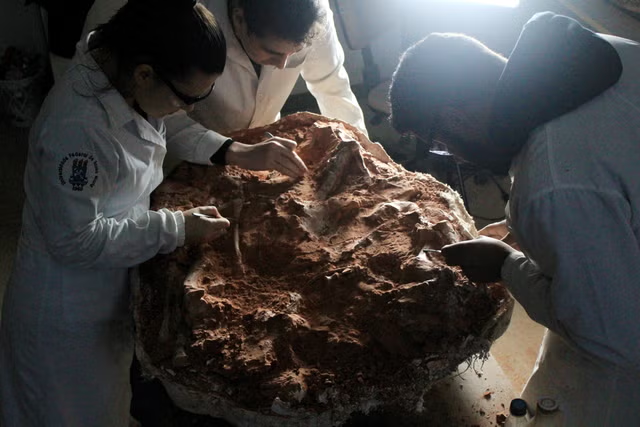Adults love to procrastinate when it comes to sending an email, doing the laundry or planning a long-awaited trip. But one thing that people should not put off is checking in on their health.
As we age, being aware of the potential signs of various illnesses and ailments can be lifesaving.
Dr. David Liska, the chair of colorectal surgery at Cleveland Clinic, told Newsweek in an interview earlier this year that the early signs of cancer depend on the specific disease. Typically, only signs of more advanced cancers, like unexplained weight loss or unexplained fatigue, are the most obvious.
Other examples of those more pronounced signs include a persistent cough for lung cancer, a breast lump or discoloration for breast cancer or bloody stool for colorectal cancer.
"One thing that people should keep in mind for any cancer is that if you develop a new symptom or something new about your body that you've noticed that wasn't there before, it's always a good idea to bring it up with your physician and discuss if further workup is needed," he said. "One should never feel embarrassed to discuss a new symptom or new finding with your physician."
In recent years, however, early-onset cancer, meaning cancer diagnosed in adults between ages 18 and 49, is on the rise. This troubling trend means that adults should start being aware of their risks and screening for certain cancers earlier.
A recent study published by the American Cancer Society found that cancer patients in the U.S. are "increasingly shifting from older to middle-aged individuals."
For example, cervical cancer is the second-leading cause of death in women aged 20 to 39, and colorectal and breast cancer are the leading causes of death for men and women, respectively, between ages 20 and 49.
"We should not dismiss the possibility of cancer just because the person is under the age of 50," Liska said. "Older people are still more likely to develop cancer than young people, but we are seeing young people develop cancer at a much higher rate."
He notes, therefore, that when a young person presents with a symptom that is potentially related to cancer, it is very common that it will be dismissed by both the patient and the health care provider.
So what can be done to catch cancer early?
Liska, who also serves as the director of the Cleveland Clinic DeBartolo Center for Young-Onset Colorectal Cancer, said understanding family history and genetics can help anticipate cancer in younger people.
"Many times, you will notice a family tree where many members in the family had cancers in early age," he said. "In those cases, it is critical to know your family history and discuss it with your physician. Because in those cases, a lot of times genetic testing will be indicated."
He notes that 30 percent of colorectal cancer patients have a family history of the disease, and it's even more important if it's a first-degree relative or multiple second-degree relatives.
If a patient has been found to have a genetic mutation that significantly increases the risk for cancer, like BRCA or Lynch syndrome genes, Liska said more can be done for prevention, including earlier screening or surgery.
"The most common cancer in women is breast cancer, then followed by lung cancer and then colorectal cancer, [and] in men, it is first prostate cancer, then lung cancer and then colorectal cancer," he said. "So if you have a family member [who] was diagnosed with colorectal cancer at the age of 45, the first screening exam should happen at age 35. [For] breast cancer, we recommend mammograms starting at age 40."
Despite the troubling reality of cancer, it is not all doom and gloom. Liska said there have been many "groundbreaking advances" that are making a huge difference across different cancer types. This includes more advanced genetic testing, the HPV vaccine to prevent cervical cancer and improvements to chemotherapeutic, radiation and surgical treatments.
Liska notes that young people should keep in mind that the side effects of cancer treatments may affect them differently than in older patients.
For young people undergoing cancer treatments, Liska said there are more measures to ensure fertility and sexual health are protected. That includes both egg and sperm preservation.
"These are obviously more important in young people, where people are still in their stages of their lives where they're having families," he said. "And many of the treatments for cancers, including chemotherapy or radiation, can affect fertility. So it's critically important before starting on treatment for cancer to discuss if the patient is interested in preserving fertility."
Overall, there is no clear explanation as to why certain people develop certain cancers. In addition to genetics, factors like smoking or obesity can also contribute to illnesses, Liska said.
"However, we also know that that's not all of the story, because I see many young patients in my clinic who are very healthy, who are athletes, who eat healthy, and nevertheless, they get colorectal cancer," he said. "So it's more difficult to attribute some of these cancers to one specific environmental risk factor."
In addition to providing diagnosis, treatment, fertility preservation and psychological and wellness assistance for patients diagnosed with colorectal cancer before 50, the DeBartolo Center for Young-Onset Colorectal Cancer also conducts research.
"[Cleveland Clinic] and others are doing a lot of research to understand what these risk factors may be," he said, "and how they could affect the risk for developing early-onset colorectal cancer or other cancers."
Liska said, in addition to genetics, there are other environmental factors that can lead to cancer. He recommends focusing on making healthy choices to decrease the likelihood of developing a serious disease.
"If someone focuses on leading a healthy lifestyle, which includes not smoking, minimizing alcohol and having a generally healthy diet, being physically active," he said, "all those factors can help reduce one's risk for cancers."
Disclaimer: The copyright of this article belongs to the original author. Reposting this article is solely for the purpose of information dissemination and does not constitute any investment advice. If there is any infringement, please contact us immediately. We will make corrections or deletions as necessary. Thank you.



